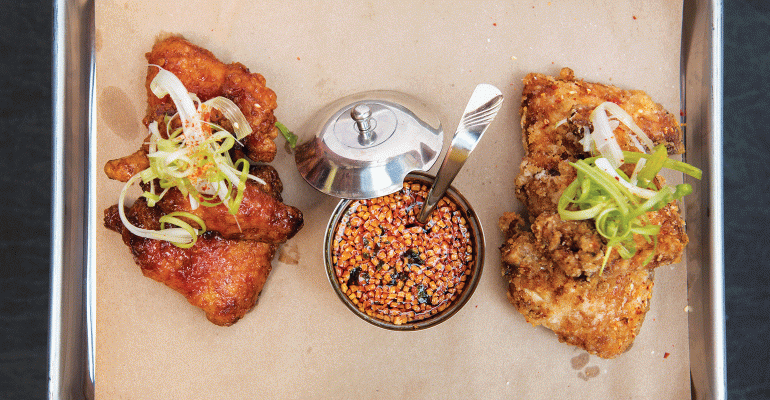At Taco Dumbo’s location in Midtown Manhattan patrons sit in a sleek, colorful dining room, while they wait for their sliced yellowtail, grain bowls, tacos or cocktails. A staff member presents the meals — and refills drinks and buss tables. But customers order from a counter here, and the executives of Retail Worx, the parent company of Taco Dumbo, are adamant that the restaurant is a fast-casual establishment.
“You can get your meal in 10 minutes or less,” said Shu de Jong, chief brand officer of Retail Worx.
“We really are creating this new category — simple, high-quality service but for people who only have 15 mins.”
While Retail Worx believes their restaurants fall into the fast-casual category competing with the likes of the Sweetgreen, Dig Inn and Chipotle, other restaurants that combine counter service and fine dining elements, have embraced a new term — fast fine or fine casual.
Charles Bililies, the founder of San Francisco-based Greek mini-chain Souvla, which elevates the traditional gyro, positions his brand as “fast fine,” he said. “It’s a subset of the more general term of fast casual.”
Like many of the new players in this space, Bililies come from fine dining, which he sees as “a relatively flawed business model,” he said.
“There's so much that goes into creating these memorable dining experiences,” said Bililies, "What have you is not super, super viable. Especially when you're looking at it in a high cost market like San Francisco or New York where commercial rents are incredibly expensive, the cost of labor is considerably expensive.”

Inside Souvla’s location in the NOPA neighborhood of San Francisco-based.
Flexible dining
Souvla and this new breed of restaurants aim to bring the hospitality, food quality, design and presentation of higher-end establishments to customers while utilizing less staff, limited menus, and a price point that appeals to a wide variety of diners. In fact, Souvla was named an NRN Breakout Brand this year.
The average checkpoint and volume of service at these establishments might be enviable to the average fast-casual operator. Restaurants in this category often find they’re continuously serving customers from lunch to dinner, with diners coming in for business lunches, family meals, date nights, and even happy hour drinks.
At Taco Dumbo, for example, the check average is $21 but increases as the evening goes on thanks to their beverage service. Souvla’s four locations now averages 850 to 900 covers a day serving sandwiches or salads that range from $12 to $14.
ChiKo, a Chinese Korean spot in Washington, D.C., is only open in the evening but still manages to turn tables throughout the night, and appeal to a wide range of diners.
“What we've noticed is that we get an early turn, which is great for us because it starts us off right at 5 o'clock and we break the highchairs out at 5 o'clock, and we put them away at 6:30,” said Andrew Kim, a partner at the restaurant.
For the rest of the evening, they cater to a younger crowd, and they even have a late-night dinner series they host with outside chefs.
One of the more unusual features found at this new type of fast-casual spots is ChiKo’s kitchen counter; diners can make reservations for a taste of the menu while seated in view of the open kitchen. It’s their take on a chefs table and tasting menu.
“That's the fine in fine casual for us,” said Kim.

The food line at Tender Green’s Chestnut Hill, Mass. location.
On the menu
“Compare to some of our competitors, everything that we make is from scratch,” said Tracy McGinnis, the director of marketing for Fox Restaurant Concepts, which owns Flower Child, a hip and healthy chain with nine locations mostly in the Southwestern United States.
“We don’t have a commissary; we don’t batch produce our sauces,” McGinnis said.
The original fast-casual chain, Chipotle, prides itself in cooking on site with classically trained chefs, but the dishes at these new fast-casual restaurants are developed and served a bit differently.
“We are not just scoop and serve,” McGinnis said. “This is a fine dining kitchen we’ve just put it in a fast-casual environment.”
Not being a scoop and serve-style restaurant is a significant distinction to many of these operators.
The dishes are fully conceived and plated with care. Diners aren’t mixing and matching bowls or creating their own burritos while walking down hotline. “You don’t see the ice cream scoopers because we don’t have them,” said de Jong.
At Tender Greens, a California-based seasonal, chain with nearly 30 locations, each restaurant has a classically-trained chef at the helm.
“Having a talented chef in each of our kitchens allows us to provide guests with thoughtfully prepared and beautifully executed dishes — just as they would experience at a fine-dining restaurant,” said Tender Greens CEO and co-founder Erik Oberholtzer.
“It's an aspect that sets us apart because our chefs hold every plate that goes out the line to the same high standard.”
The menu at most of these new fast-casual restaurants feature limited options that are chocked full of local, high-quality ingredients.
“The menu in and of itself has not changed in the four years since we've opened [and] it doesn't exactly present itself on the menu, but there's a fair amount of cross-utilization of product that has allowed us to really streamline our supply chain,” said Bililies.
At Martina in New York City, part of Union Square Hospitality Group, the Roman-style pizza shop doesn’t take “any shortcuts on the sourcing of our products,” said executive chef, Nick Anderer.
Martina is a far cry from the new crop of fast-casual pizza shops like Blaze or MOD where dough is at the ready for diners to choose their toppings and create their own pies in minutes. The pizza menu at Martina established by the chef; the dough is stretch to order. “It's not an assembly line, we are cooking from scratch,” said Anderer.
There’s similar consideration for the wine list at many of these fast-casual restaurants.
“I don't think we were looking to fine luxury wines we just wanted to find good wines,” said Anderer. “A list that was a little more thoughtful than the average fast-casual restaurant. We just wanted to make sure the entire experience from pizza to wine was complete.”
At Taco Dumbo there’s a full bar and cold-pressed juice margaritas, and the restaurants does a robust business during happy hour. Souvla serves a selection of eight Greek wines by the glass, carafe and bottle. Flowerchild serves wines and local beers at each of their locations.
Champagne served on a metal tray at Martina
In the details
“Is it nice enough to take a date to?” this is the litmus test Jen Pelka, the founder & CEO, Magnum PR, uses when trying to define the fast-fine.
Pelka, represents a number of San Francisco-based restaurants in this category. Pelka and her husband, Bililies of Souvla, frequently discuss what elements make up this new restaurant experience.
Sometimes it's the obvious — real dinnerware, candlelit tables — and sometimes it’s something more abstract, like hospitality.
Hospitality is the most important thing Anderer brought over from fine dining to Martina, he said. “We still hire the same way,” he said. “We're looking for people who have strong emotional skills and know how to deliver warm hospitality day in day out.”
At Flower Child the experience for diners starts with a greeting often from an official greeter, a common aspect of these upscale fast-casual restaurants, where sometimes diners are confused about the ordering process.
There’s a menu board as well as a handheld one for diners to pursue. The spaces are well designed, with vases of flowers and books and cheerful, colorful murals. Guests order from a counter, but after that, the process resembles a sit-down restaurant. A staff member brings meals served on non-disposable dinnerware to guests at their tables. If guests are missing flatware or water, staff members are trained to fetch these.
Established fast-casual players have also incorporated finer elements. Fast casual Italian chain Fazoli’s, for example, saw success a few years back when it shifting to real plates and began delivering food directly to diners.
While these restaurants don’t hire traditional servers, and therefore cut some of the costs associated with casual and fine dining, they do have table runners who are often trained to think beyond simply dropping of a dish.
“What we’re training for is a small dining room where we're always trying to keep the tables clean and tidy and if you see an empty glass, see if anybody needs a refill,” said Kim. “We're still trying to give great service in a fast-casual setting without having that quote-unquote server or waiter.”
Contact Gloria Dawson at [email protected]
Follow her on Twitter: @gloriadawson





